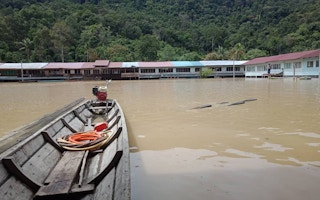For the second time this year, the Malaysian states of Sarawak and Sabah have been hit by devastating floods. The remote longhouses that haven’t been submerged are now little islands of safety, with dozens of families isolated from the outside world by both a strict Covid-19 movement control order and rising floodwaters.
It has long been understood that deforestation exacerbates both flooding and drought, as does climate change. Sarawak, a biodiversity hotspot, has experienced some of the most intensive logging in Asia over the past three decades.
World Resources Institute reports that Sarawak has one of the highest rates of degradation of intact forest landscapes of anywhere in the world, both in terms of percentage and area. Remote indigenous communities are now bearing the brunt of an altered landscape compounded by an altered climate.
For decades, communities have been organising to protect the forests that are left, with the hopes of repairing some of what has been lost. For the past year, the #StopTheChop campaign against timber expansion in the Baram region of Sarawak has been building momentum, with more and more communities joining the call to put a stop to logging on their lands.
A national and international campaign is now growing around these communities. As far as the export market is concerned, buyers often believe products are sustainably sourced if they are certified by bodies such as the Malaysian Timber Certification Council (MTCC) and the Program for the Endorsement of Forest Certification (PEFC). However, over the last year pushback from local communities whose forests have been certified by these bodies raises serious doubts about the reliability of these programs.
36 indigenous Penan and Kenyah communities earlier in May lodged official complaints with the MTCC, asking for reconsideration of timber giant Samling’s concessions on their land. This comes after many months of documenting a lack of free, prior and informed consent, and reportedly unpermitted logging outside of approved coupes — including in watershed areas crucial to preventing flooding.
Communities also question the validity of consent provided in cases where no environmental or social impact assessments have been released to affected communities or the public.
Samling and MTCC have gone to great pains to refute these claims without engaging with communities in any meaningful way or releasing these crucial documents. Now, Samling has resorted to threatening Indigenous communities with legal action in an unprecedented move that seems designed to silence criticism.
The Kenyah community of Long Moh and the Penan communities of Long Ajeng, Long Lamam, Long Murung, Long Benali, Ba Pengaran Iman, Ba Pengaran Kelian, Long Main, Long Kepang, Long Sabai and Ba Kerameu have received letters threatening legal action. All of these communities have voiced concerns about Samling group’s operations on their lands.
These threats come as communities in the Baram are organising to create the Baram Peace Park together with international backers. Part of this process will be cooperating with the Sarawak State Government and timber giants like Samling, and seeking to establish some kind of working relationship between local communities and the logging companies that routinely ignore their concerns. Communities are used to being ignored, but legal harassment brings the #StopTheChop campaign into new and worrying territory.
Many argue that suits aimed at silencing activists and vulnerable communities are on the rise around the world. As floodwaters subside, environmental defenders in Sarawak’s remote interior are left wondering how they will access, let alone pay for legal representation if Samling follows through on its threats.
Fiona McAlpine is Communications and Project Manager for The Borneo Project, a non-profit working with indigenous communities in Malaysian Borneo. To find out more about their work, head to borneoproject.org.











